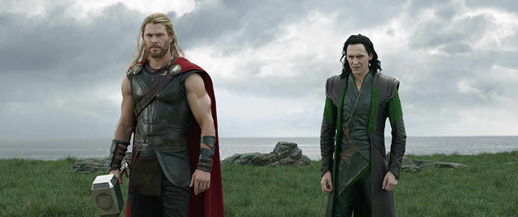|
|
Movie Review - Thor: RagnarokBy Matthew HuntleyNovember 14, 2017
But Thor quickly learns a hero's job is never done, because once Hela arrives, her powers overcome him and she destroys his beloved hammer, Mjolnir, which Thor believes to be his source of power. When the siblings battle it out for the first time, Hela wins and Thor and Loki wind up on the funky garbage planet Sakaar, which is ruled by an egomaniac known as the Grandmaster (Jeff Goldblum). He's captured and handed over by Valkyrie (Tessa Thompson), a former Asgardian warrior-turned-bounty-hunter and forced to compete as one of the Grandmaster's gladiators, pitting him against his old Avenger pal, The Hulk (Mark Ruffalo), who has resided on Sakaar for the past two years, ever since the events of Avengers: Age of Ultron. During this time, Hulk has not turned back into his human alter-ego, Bruce Banner, and Banner is afraid the next time this happens, his transformation into the Hulk will be permanent. There is a mild significance to the plot, I suppose, as it once again pushes the Marvel Universe forward toward the next chapter, but it's not as important, per se, as the more momentous Captain America: Civil War, which had farther-reaching story and character consequences. This aspect of Thor: Ragnarok, which feels more like a self-contained superhero adventure, allows it the freedom to do its own thing, and Waititi and his crew seize that opportunity by making the movie particularly jolly and irreverent. They utilize the cast's talents as comedians rather than as dramatic actors, allowing them to let loose. It proves these ceaseless MCU movies can, in fact, evolve, change course from time to time, and take a different approach to otherwise standard material without sacrificing quality. The movie's overall vibe is one of high spirits and rhythmic energy, accentuated by several punchy and well-timed slapstick moments, as well as Mark Mothersbaugh's offbeat yet completely fitting synthesizer musical score, which further reflects the filmmakers' desire to be innovative and perhaps exude an attitude that makes it seem like they're getting away with something. This brings a freshness and vitality to a genre that's not always known for reinventing itself. I wouldn't go so far as to say the makers of Thor: Ragnarok push the boundaries too far beyond what they know fans will find acceptable and comfortable (it's still a blockbuster superhero movie in every sense of the phrase, especially the mostly perfunctory ending), but they lend it a different kind of style and sense of humor that keeps it moving, funny and exciting. Thor: Ragnarok may not be the first Marvel movie fans think of when they want to catch up on major plot events or are seeking a heavy, dramatic experience, but it will be near the top of the list when they're simply looking for a mellow and playful one.
|

|
|
|

|
Thursday, October 31, 2024
© 2024 Box Office Prophets, a division of One Of Us, Inc.


